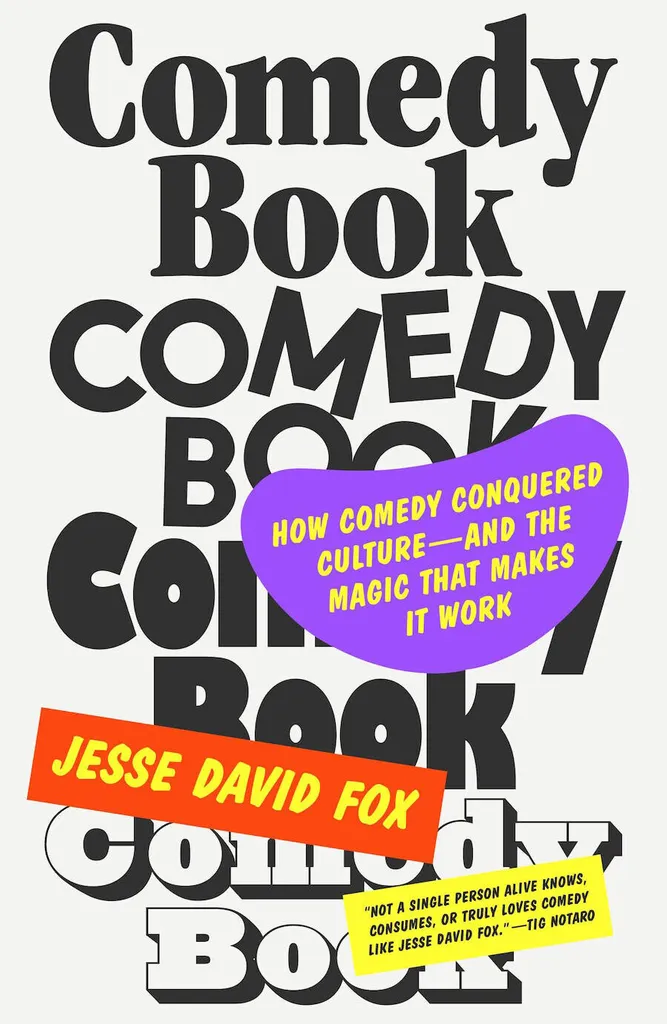- December 05, 2023
- By Sala Levin ’10
In 1993, when writer Jesse David Fox ’07 was 7 years old, his mother died, leaving the young Fox feeling like he was “flipping and flipping through space, floating away from my ship and Earth.” Outside of his family, one of his few tethers to reality was “The Simpsons,” which went into widespread syndication that year.
“Jokes offered a state I could stay in that made life seem more manageable,” Fox writes in his new book, “Comedy Book: How Comedy Conquered Culture—and the Magic That Makes It Work.” “No matter how bad or how nothing I felt … I wasn’t not going to laugh when Sideshow Bob stepped on yet another rake.”
That was the beginning of a lifelong obsession with humor that eventually led the Vulture senior editor and comedy critic and host of “Good One: A Podcast About Jokes” to write “Comedy Book,” which analyzes how and why comedy has exploded in popularity and esteem over the last 35 or so years. (In 1989, the year “Seinfeld” premiered, no comedian had ever headlined Madison Square Garden, Fox notes. By 2023, 18 had.)

In the book, Fox breaks down comedy into 11 components, including timing, audience, truth, politics and community, to explore what exactly makes a joke work—or flop. For each topic, Fox presents case studies: In the chapter on timing, an airplane joke the late Gilbert Gottfried told in New York City on Sept. 29, 2001, illustrates Fox’s concept of “too soon.” In a segment on audience, he scrutinizes how Chris Rock intentionally bombs while working out new material—mumbling, keeping his coat on as if ready to flee the stage at a moment’s notice—to see what gets a laugh even in the worst possible presentation.
Writing a book hadn’t always been on Fox’s to-do list. At UMD, where he majored in psychology, he was active in Student Entertainment Events, booking pop-punk bands like Brand New, Dashboard Confessional and All-American Rejects, and snagging U.S. Rep. Steny Hoyer ’63 to give his first commencement address. (“The thing I didn’t realize is when you book the speaker, you also have to introduce them at the ceremony, so I had to speak at my graduation,” said Fox.)
[Critic Thinking: Vulture Writer Makes Sharp Points on Popular Culture]
After college, he worked at a talent agency and as a freelance writer before landing at Vulture in 2012. Fox tried standup comedy, once. "I said a joke out loud, and the audience made a noise that I thought was laughter," he writes in the book. "But it wasn’t laughter. It was an acknowledgment of a joke.”
In 2019, after a few scripted television projects fell through, Fox found himself inspired by art critic John Berger’s book “Ways of Seeing,” considered a seminal text on the act of looking at art. That year, he’d also written a ranked list of every Adam Sandler movie for Vulture (“Click” came out on top, by his estimation), and wanted to write a book just on “the Sandman,” as he likes to call Sandler. When his agent nixed that, the topic turned to comedy more broadly.
“Like many of his subjects, Fox knows his way around a pointed one-liner,” Rich Juzwiak wrote in a New York Times review of “Comedy Book.” “That such rigorous thinking should at one point lead him to defend an Adam Sandler poop joke is a great gag in itself.”
Indeed, Fox has no beef with the lowbrow. “Comedy doesn’t need to be rooted in personal experiences,” he said. “You can do something silly. Insomuch as life is hard, the fact that silliness works is because it’s in contrast to how hard life is.”
Still, he acknowledges, scatological jokes may get a laugh (and a laugh is a laugh, as the comedy maxim goes), but they’ll never touch audiences in the way a joke about mortality or mental illness or marriage will. “Comedy has the power to relieve people’s anxieties about things,” he said. “When you’re talking about things people have a traumatic relationship to, that’s comedy reaching its fullest potential as a societal good.”
Topics
People